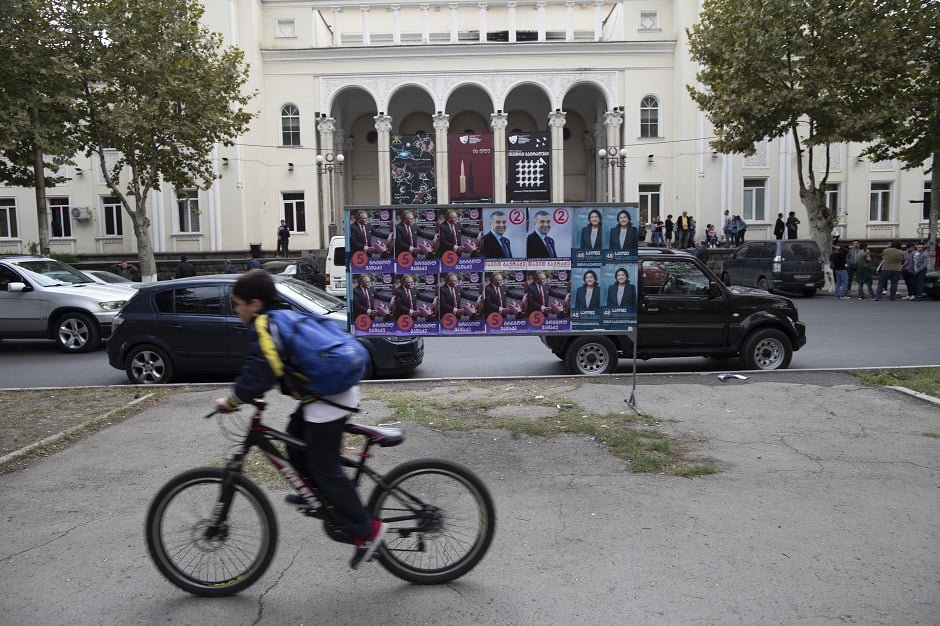
News
Runoff Campaign: Timeline of Major Developments
In the first round of Presidential election on October 28, no candidate garnered more than 50% of votes. Runoff between two top contenders, Salome Zurabishvili and Grigol Vashadze, who finished with 38.64% and 37.74%, respectively, will take place on November 28.
Below you can find the timeline of major developments before the Presidential runoff.
- October 28 – Davit Bakradze, presidential candidate of the European Georgia, admitted defeat and threw his weight behind UNM-led coalition’s Grigol Vashadze;
- October 29 – Tbilisi Mayor Kakha Kaladze, who serves as the general secretary of the ruling Georgian Dream-Democratic Georgia (GDDG) party, said the presidential elections sent an important message to the authorities;
- October 30 – Salome Zurabishvili made her first official press statement after the first round of elections, saying she will compete in the second round runoffs, and vowing “not to let” Georgia fall to Russia and Grigol Vashadze;
- October 30 – Imedi TV, one of the major national broadcasters leaning towards the government, pledged to confront the United National Movement through changing its regular broadcasting schedule;
- October 30 – MPs from the ruling party alluded to the possibility of civil confrontation in case the UNM-led coalition’s Grigol Vashadze wins the second round of Presidential polls;
- October 30 – Ex-President Mikheil Saakashvili, UNM’s honorary chairman, said he will not seek presidential pardon if Grigol Vashadze wins the second round;
- October 31 – GDDG leader Bidzina Ivanishvili launched meetings with party leadership to hash out the strategy for the second round of Presidential polls;
- November 2 – Republican Party, a liberal opposition party in Georgia, announced it would join the Vashadze camp;
- November 2 – Parliament Speaker Irakli Kobakhidze announced the authorities would withdraw the controversial bill that was to legalize cultivation of medical cannabis;
- November 4 – Grigol Vashadze resumed campaigning in the regions, with an indoor gathering in Kutaisi. The meeting was attended by leaders of the opposition coalition, as well as politicians from the European Georgia and the Republican Party;
- November 5 – Bidzina Ivanishvili addressed the nation, promising he will take the responsibility “for redressing in one year all errors of governance.” He also called on the Georgian Dream’s “old guard” to join the Zurabishvili campaign;
- November 7 – Political leaders and citizens groups held two separate protest rallies in Tbilisi, to mark the police crackdown on opposition protests on November 7, 2007, and to express their outrage at the possible election of Grigol Vashadze. Groups affiliated with the ruling party launched anti-UNM meetings countrywide;
- November 8 – Prime Minister Mamuka Bakhtadze announced the government plan to increase spending for social programs, and that “a citizen, who receives social allowance, will still receive it in the course of the coming year, irrespective of whether he/she finds a job;”
- November 8 – Georgia’s key election watchdogs denounced the social spending hike, explaining that this “can clearly be characterized as electorally motivated public spending” that equals to the use of administrative resources for electoral purposes;
- November 8 – Salome Zurabishvili, presidential hopeful backed by the ruling party, resumed campaigning, visiting village Atotsi in Kareli Municipality on the edge of the Russian-held Tskhinvali Region/South Ossetia;
- November 8 – Lieutenant General (retired) Devi Chankotadze, Chief of the Joint Staff of the Armed Forces in 2009-2012, issued a video address, speaking against Salome Zurabishvili’s controversial Russo-Georgian War-related remarks. The incumbent army chief condemned the statement as an attempt to “entangle” the army in political processes;
- November 12 – Salome Zurabishvili announced that she had received death threats through text and voice messages, claiming that the persons issuing threats were former servicemen, linked to the UNM. The opposition denied the allegations;
- November 14 – The Central Election Commission set the runoff day on Wednesday, November 28, amid criticism from the opposition and the election watchdogs;
- November 15 – A number of new billboards were placed and new video ads were aired, where Salome Zurabishvili’s image was replaced by Bidzina Ivanishvili, Mamuka Bakhtadze, Kakha Kaladze, Davit Sergeenko and Irakli Kobakhidze. The ruling party explained the change as part of its new strategy in the lead up to runoffs;
- November 19 – PM Bakhtadze announced the debt write off scheme for more than 600,000 individuals. CSOs criticized the move as an attempt to bribe the voters;
- November 19 – CSOs reported on “wide-spread,” and “unprecedented” forms of voter intimidation in favor of Salome Zurabishvili;
- November 20 – The Prosecutor’s office launched investigation into alleged printing of fake IDs, following CSO accusations;
- November 20 – Bidzina Ivanishvili gave a televised interview to Imedi TV, speaking among others on the merits of Salome Zurabishvili’s candidacy;
- November 21 – CEC released the number of eligible voters, with the election roll growing by nearly 10,000 voters between the two rounds;
- November 23 – Orthodox Patriarch Ilia II weighed in on the runoff, expressing hope that the candidates will accept the election results;
- November 25 – The Alliance of Patriots, a radical right-wing outfit, rallied against the opposition candidate in Tbilisi, reiterating the party’s electoral support for Salome Zurabishvili, two days after holding a smaller demonstration in Batumi;
- November 26 – Early voting held for Georgian troops in Afghanistan;
- November 26 – Former Prime Minister Irakli Garibashvili expressed support to Zurabishvili, slamming ex-President Saakashvili’s “unjust, oppressive and violent” regime;
- November 27 – PM Bakhtadze addressed the nation, pledging “free, transparent and democratic” conduct of elections. “I am sure that November 28 will turn into yet another victory of Georgian democracy,” the Prime Minister said.
For the extended background, we recommend visiting our tag on the 2018 Presidential Elections.
This post is also available in: ქართული Русский